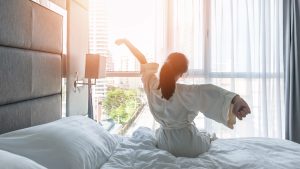 We recently looked at how an oral appliance known as a custom splint could stop disorders like TMD or bruxism (teeth grinding). But did you know we could use other oral appliances to treat obstructive sleep apnea (OSA)? In today’s blog, your Astoria, NY, dentist will explain how we treat common sleep disorders and offer relief!
We recently looked at how an oral appliance known as a custom splint could stop disorders like TMD or bruxism (teeth grinding). But did you know we could use other oral appliances to treat obstructive sleep apnea (OSA)? In today’s blog, your Astoria, NY, dentist will explain how we treat common sleep disorders and offer relief!
The Dangers of Untreated Sleep Apnea
Sleep apnea means that as you sleep, you stop breathing for brief periods. These interruptions to your breathing occur when soft tissues in your throat and mouth become too relaxed and subsequently collapse, blocking airflow. For some, this could happen hundreds of times in a single night. Even if you don’t remember it happening, this begins to lead to exhaustion and could strain your immune system, so more frequent illness is possible. For others, this could eventually strain your cardiovascular system, increasing the risk of heart disease, high blood pressure, heart attack, and stroke.
Causes and Warning Signs
OSA could develop due to a large neck circumference, obesity, excessive alcohol consumption, deviated septum, and sinus and allergy issues. While teens and people of all genders could suffer from OSA, men 55 and older are at an especially high risk. People with OSA may report snoring, waking in the night choking or gasping for air, headaches, dry mouth, trouble staying focused or awake, daytime exhaustion, and moodiness. If one or more of these potential warning signs sounds familiar, then please contact our team right away for a diagnosis.
Our Approach to Treatment
A detailed examination that employs advanced technology will enable our team to decide if you need treatment for OSA. If so, we next take a series of detailed digital images and impressions. The information we gather allows us to design and craft an oral appliance in a dental lab setting. When completed, this oral splint will fit and look much like a mouthguard. The device actually repositions your jaw while you sleep, moving it forward to prevent the collapse of soft tissues. You breathe without interruption, so you enjoy better sleep and feel more rested the next day. You also avoid the use of a CPAP machine too.
You can also help with better resting habits. Go to bed and wake up at the same times daily. Keep your bedroom dark and cool, and avoid screens right before bed. Also, limit vigorous exercise, large meals, or alcoholic beverages in the two hours before going to bed.
Do You Have Questions About General Dentistry?
We want to help you avoid complications due to disorders like OSA. To learn more about how we improve your rest with an oral appliance, then schedule a consultation by calling Jeffrey Leibowitz, DDS, in Astoria, NY, today at 718-728-8320.


